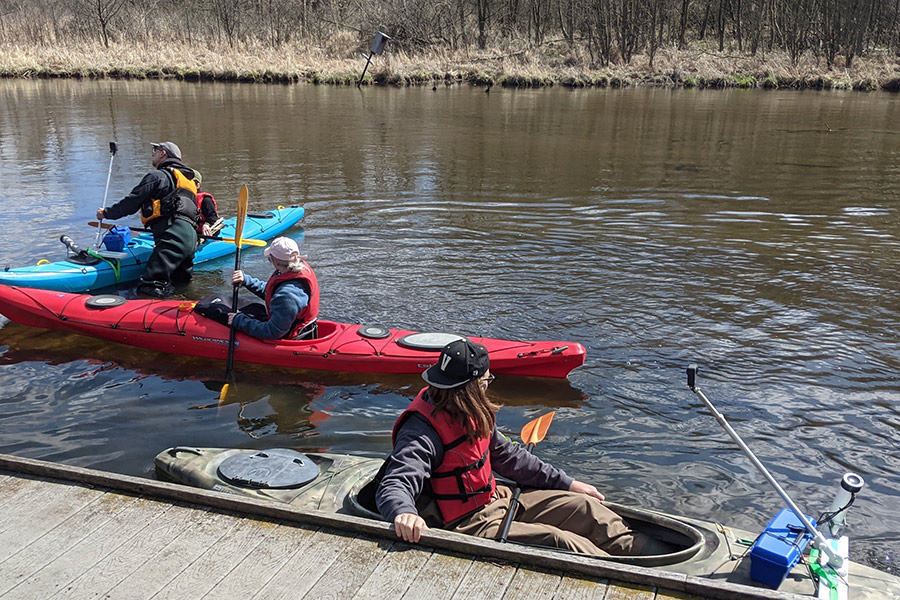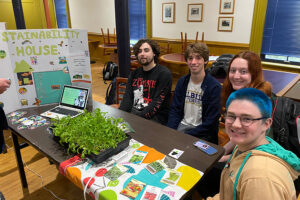Earth Day, an Albion Classic, Still Going Strong
Snapshots of some of the many current efforts on and around campus.
April 19, 2022

Joe Lee-Cullin’s Honors students recently ventured out onto the Kalamazoo River for a class excursion.
By Ariel Berry
Earth Day, April 22, is special for several reasons. It’s a time when people around the globe take time to reflect on the importance of the health of the planet. Many even participate in volunteer activities toward this end, or make lifestyle changes to reduce energy waste.
At Albion College, Earth Day is special for all of these reasons, with one more: it is one of Albion’s claims to fame. The College, and the City of Albion surrounding it, were among the first to celebrate Earth Day in 1970, and were featured in a Walter Cronkite-hosted prime-time CBS News special at the time. The segment features Albion College students and Albion residents doing their best to make a difference.
It may be more than 50 years later, but that civic-minded spirit at Albion College hasn’t changed. In fact, it has grown.
Dr. Joe Lee-Cullin, assistant professor of earth and environment, is currently teaching a Prentiss M. Brown Honors Program class titled Citizen Science and Community Engagement in the Natural Sciences. As they describe it, the class focuses on “How do we get participation of nonscientists in science?”
The class is designing stream gauges, essentially large rulers, to be placed in each branch of the Kalamazoo River, along with signage that will encourage passersby to note the water level and text their observation to a number provided. The data will be automatically entered into a spreadsheet, which will be available through the class’s community partner, the Kalamazoo River Watershed Council.
The process may be simple, but the implications for “scientists, kayakers, canoers, those sorts of people” will be valuable, says Lee-Cullin. Knowing how much water is in the river at a certain point can tell hydrologists like Lee-Cullin a lot about the health of the land around the river, as well as the water.
“We all live within the environment and rely on the environment,” says Lee-Cullin, adding that learning about it and developing ways to preserve it are essential. “We’re part of the environment, and so without sustaining it, that just has very bad implications for us.”
Lee-Cullin, who joined the Albion faculty in 2020 after receiving their Ph.D. from Michigan State University, is enthusiastic about Earth Day and the work it inspires: “A thing I value about Earth Day is that it is a time when you have a critical mass of people actually thinking about the Earth, and I think that’s important.
“I think part of the impetus for my stream gauges wasn’t necessarily that data collection is the most important thing,” they continue. “But it’s a way to get people to look at the stream. So often the trees and the soil and the water, they all just become a backdrop to our lives and we just get used to it, and don’t think about it. So I think Earth Day, actually putting the planet in focus and thinking about how we live on the planet, is super-critical, and I hope my course is helping students to gain an appreciation for that.”
Support Across Campus

The students of next year’s Sustainability House: Sid Childers, ’24, Drake Malcolm, ’24, Alyvia Fondren, ’24, Emmet Burns, ’23.
Students across campus, even those not in Lee-Cullin’s class, are certainly taking the environment seriously this month. April 13, students participated in a Green Day poster fair, where student groups gathered in the Kellogg Center’s Gerstacker Commons to present their environmental passions to the world. The room was alive with excitement as students lined up out the door, eager to make their way in among the tables.
One such table was for the Sustainability House, presented by a group of students who have made plans to live together next year in a place where they can actively compost and cook sustainable food. Something they’re passionate about is Meatless Earth Day, which takes place at Baldwin.
One of the students, Emmet Burns, ’23, explains, “Meatless Earth Day is where they’re trying to create more sustainable meal options, so for that whole day there’ll be no meat on the menu. It’s going to be vegetarian or vegan-catered items for the entire day in Baldwin, for the entirety that they’re open, breakfast to dinner.”
Burns adds, “It’s important because there’s a lot of waste that is put into the meat industry, a lot of water waste, a lot of food waste. So it’s just a way that they’re trying, during Earth Day, to show what kind of waste we can get around by doing a meatless option.”
Albion continues to build on its strong foundation of honoring Earth Day. Dean of Faculty Dr. Thom Wilch, professor of earth and environment, serves as faculty director of the Center for Sustainability and the Environment and also co-chairs the Sustainability Council, a group that advises the College on sustainability issues. “In many ways the original Earth Day was a turning point in environmental awareness, science, activism and legislation,” Wilch says. “A few months after the first Earth Day, Congress enacted the Clean Air Act, and in December 1970 President Richard Nixon created the Environmental Protection Agency.”
He adds that while Earth Day is now celebrated globally and much progress has been made, the environmental issues of 1970 remain problems today.
“Since then, the consequences of environmental degradation have become more profound,” Wilch says. “In 1970 no one was concerned about climate, but now the climate crisis has become an existential issue. I am motivated by the many students at Albion who are concerned about the environment and climate change, and who want to take action to make a more sustainable and just college, community and world.”